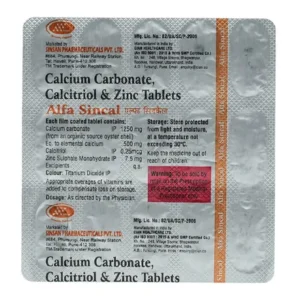ALFACALCIDOL + ELEMENTAL CALCIUM
Alfacalcidol: Alfacalcidol is a medication that belongs to the class of drugs called vitamin D analogs. It is used to treat conditions caused by a deficiency or abnormal metabolism of vitamin D, such as hypoparathyroidism, osteoporosis, and renal osteodystrophy.
The mechanism of action of Alfacalcidol involves activation of the vitamin D receptor in the intestines, promoting the absorption of calcium and phosphate from the gastrointestinal tract into the bloodstream. This helps to regulate calcium levels and maintain proper bone health.
The dose of Alfacalcidol varies depending on the individual’s condition and needs. It is usually taken orally as capsules or liquid. The dosage is typically determined by a healthcare professional and may need to be adjusted over time based on blood tests and response to treatment.
Like any medication, Alfacalcidol can have side effects. Common side effects include nausea, vomiting, dry mouth, constipation, headache, weakness, and increased thirst. Rarely, it may cause allergic reactions, such as rash, itching, or swelling. It is important to report any severe or persistent side effects to a healthcare provider.
Alfacalcidol may interact with other medications, so it is crucial to inform the healthcare provider about all the drugs and supplements being taken. Additionally, it is important to maintain regular appointments with the healthcare provider for monitoring the response to therapy and adjusting the dosage if necessary.
Elemental Calcium: Drug: Elemental Calcium
Use: Elemental calcium is a mineral supplement that is used to prevent or treat calcium deficiency in the body. It is commonly used to maintain healthy bones and teeth, support proper nerve and muscle function, and aid in blood clotting.
Mechanism of Action: Calcium is an essential mineral that plays a crucial role in various bodily functions. It is the most abundant mineral in the body and is primarily stored in the bones and teeth. Calcium serves as a signaling molecule that mediates numerous cellular processes. It helps in the contraction and relaxation of muscles, including the heart muscle, and it promotes the release of neurotransmitters. In addition, calcium aids in the clotting of blood by participating in the coagulation cascade. Calcium supplements provide the body with an additional source of this essential mineral when dietary intake is inadequate.
Dose: The dosage of elemental calcium depends on the individual’s age, sex, and specific medical conditions. Generally, the recommended daily intake of elemental calcium for adults is around 1000 to 1300 mg. For pregnant or breastfeeding women, the recommended dose may be higher. It is important to note that the body can only absorb a limited amount of calcium at a time, so it is usually advised to split the dosage throughout the day.
Side Effects: Elemental calcium supplements are generally safe when taken as directed. However, some individuals may experience side effects such as constipation, stomach upset, gas, bloating, or nausea. These side effects can be minimized by taking calcium supplements with food or by choosing a different form of calcium, such as calcium citrate, which is better absorbed by the body. In rare cases, excessive calcium intake can lead to hypercalcemia, which is characterized by symptoms like fatigue, weakness, confusion, and irregular heartbeat. It is important to adhere to the recommended dosage and consult a healthcare professional if any concerning side effects occur. Additionally, calcium supplements may interact with certain medications, so it is advisable to inform your doctor about any other medications you are taking.


